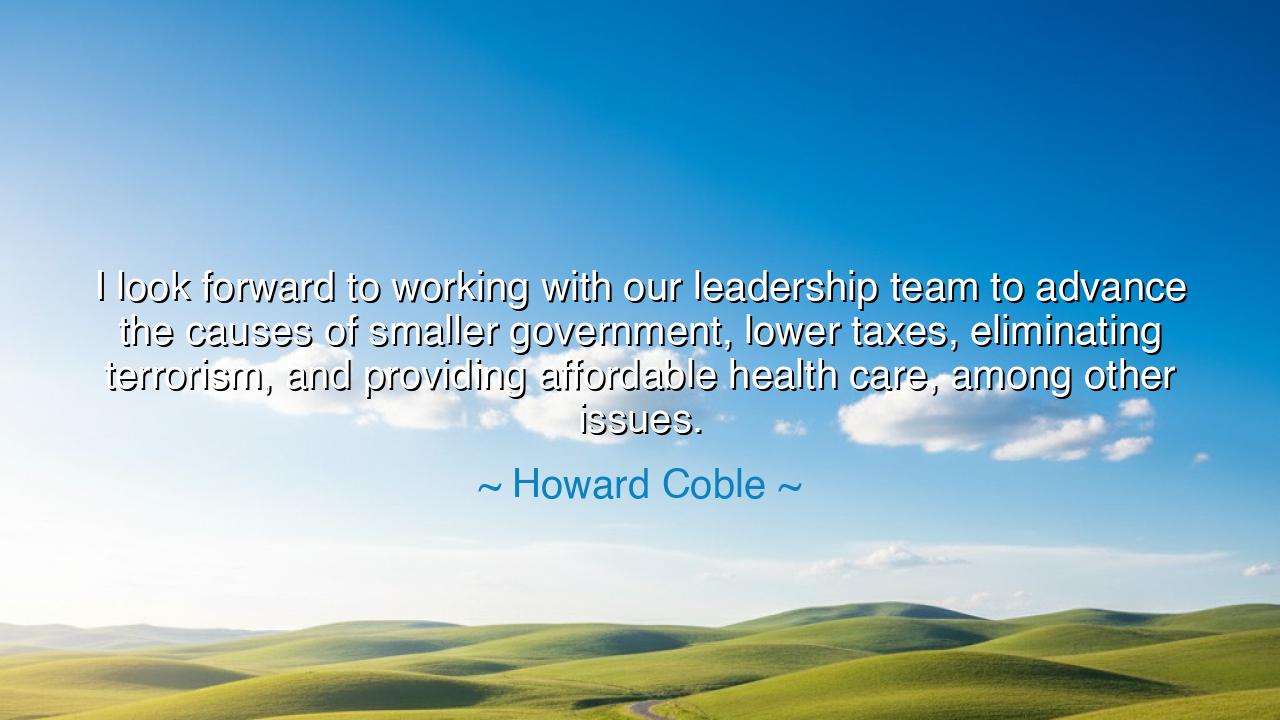
I look forward to working with our leadership team to advance the
I look forward to working with our leadership team to advance the causes of smaller government, lower taxes, eliminating terrorism, and providing affordable health care, among other issues.






The words of Howard Coble — “I look forward to working with our leadership team to advance the causes of smaller government, lower taxes, eliminating terrorism, and providing affordable health care, among other issues” — reflect the creed of a public servant devoted to balance, responsibility, and service. Spoken by a man who served his nation with humility and conviction, these words are not mere political aims, but the articulation of an ancient ideal — the pursuit of order through harmony, and of freedom tempered by justice. Coble’s statement embodies the timeless tension that lies at the heart of governance: how to preserve liberty while ensuring protection, how to uphold prosperity without forsaking compassion.
To understand the meaning behind his words, one must see them as the voice of a leader standing at the crossroads between principle and practice. When Coble speaks of smaller government, he is invoking a vision as old as democracy itself — the belief that power, like fire, must be contained lest it consume the people it is meant to serve. He echoes the wisdom of the American founders, who saw that unchecked authority corrupts, and that the truest form of governance is one in which citizens remain the masters of their destiny. His call for lower taxes is not a cry of greed, but a declaration of trust — that a free people, given the means to shape their own prosperity, will build a society more vibrant and enduring than one burdened by dependency or excess control.
Yet Coble’s vision extends beyond the realm of finance and structure. When he speaks of eliminating terrorism, he reminds us that peace and security are not luxuries but sacred duties of leadership. The modern world, like the ancient empires before it, must forever guard against those who seek to destroy through fear what humanity has built through courage. His words call forth the spirit of all those who have stood against chaos — from the Roman legions defending their republic, to the citizens of the free world standing united against tyranny. In his conviction, we hear the eternal truth: that liberty, once won, must be defended not only by armies, but by the unwavering resolve of a people who cherish it.
But then, with equal weight, Coble turns to the matter of affordable health care — a cause that softens the edge of governance with the touch of mercy. For what is leadership if it does not care for the wellbeing of its people? Here lies the moral complement to his earlier calls for freedom and restraint: the understanding that justice without compassion becomes cruelty, and liberty without empathy becomes hollow. Like the great kings and philosophers of old — Marcus Aurelius, Ashoka, Lincoln — Coble’s vision seeks balance. Smaller government must not mean a smaller heart. Lower taxes must not mean a diminished duty to care for the sick and the weak. True leadership, he implies, lies not in choosing between strength and kindness, but in weaving both into the same fabric of governance.
This harmony between restraint and compassion has been the cornerstone of great civilizations. Consider Pericles of Athens, who sought to strengthen democracy not through domination, but through participation — who balanced defense with education, and wealth with public welfare. His Athens flourished not merely because it was free, but because it was fair. Or Dwight D. Eisenhower, who led with the calm strength of a soldier and the measured heart of a statesman. Eisenhower too championed balanced government — disciplined in scope, yet humane in purpose. Like Coble, he knew that a nation’s greatness is not measured by the reach of its laws, but by the well-being and character of its citizens.
Coble’s leadership philosophy also reflects the spirit of teamwork and shared purpose. “Working with our leadership team,” he says — a reminder that even the most steadfast vision cannot stand alone. The ancients taught that wisdom grows through counsel, and that no ruler, however wise, can see all ends. To lead effectively, one must walk with others — with humility, with open ears, and with a steadfast commitment to dialogue. In this, Coble’s words resonate with the model of the Roman Senate or the American founders: leadership as collaboration, not command; service as cooperation, not conquest.
The lesson of Howard Coble’s quote reaches beyond politics into the heart of all human enterprise. Whether in government, business, or family, success lies in balance — in uniting vision with virtue, courage with compassion, and discipline with care. It teaches that leadership is not the art of domination, but the craft of harmony: of knowing when to act boldly, when to restrain, and always why to serve. Those who would lead must remember that freedom without justice breeds division, and generosity without prudence breeds ruin. The wise leader — and the wise citizen — must hold both truths as sacred.
Therefore, let the words of Howard Coble be remembered as a blueprint not just for governance, but for life itself: to seek balance in all things; to protect liberty without forsaking love; to build strength without losing mercy; and to lead, always, through service. For as the ancients taught and the wise have confirmed through the ages, the true measure of leadership is not in what one commands, but in what one preserves — the peace, dignity, and hope of the people one serves.






AAdministratorAdministrator
Welcome, honored guests. Please leave a comment, we will respond soon